In absence of a theatre, Khalid Bashir Gura watched The Kashmir Files in bits and pieces to offer a peephole view of the Bollywood film that has taken the Indian audience by storm to the extent that Prime Minister Narendra Modi endorsed and defended it.
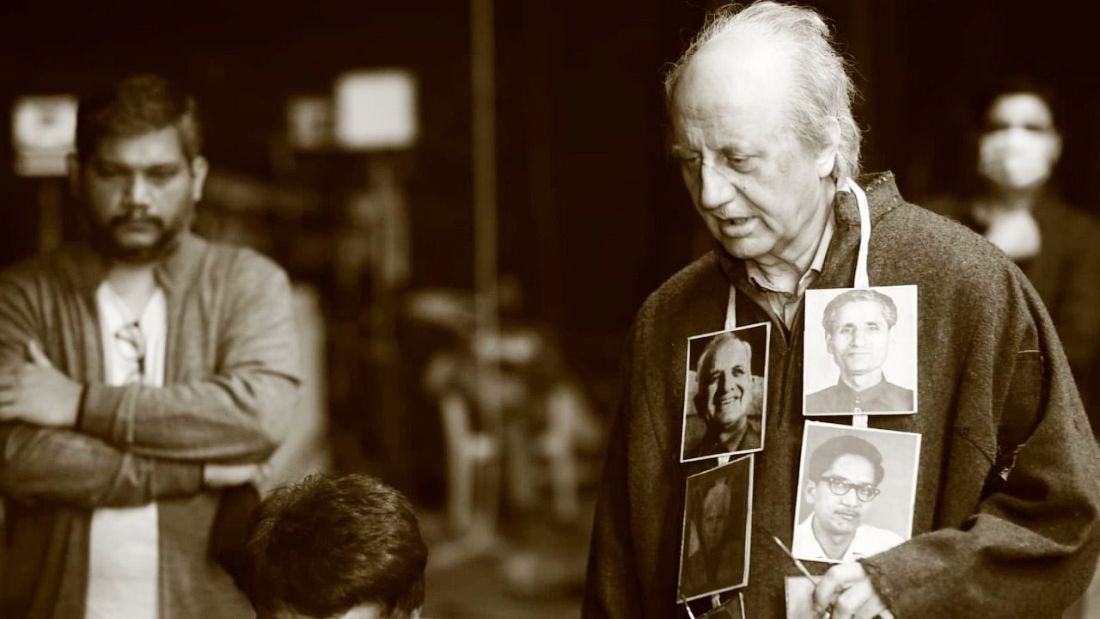
As the cinemas in Kashmir remain closed for more than three decades, Kashmiri audiences searched and relied on the internet for the hotly debated movie, The Kashmir Files, which claims to present facts of militancy’s amorphous years.
Ever since, the Bollywood shot The Storm Over Kashmir, scripted around 1947’s tribal raids – a story personally approved by Kashmir’s towering leader, Sheikh Mohammad Abdullah in 1951, Bombay had a long love affair with Kashmir. Kashmir served as the perfect, idyllic backdrop to films as the gullible Kashmiris continued offering stunning boat rowers and goat-herders.
However, militancy marked a dramatic departure. Now it became a site for contestation and assertiveness to disseminate a strong sense of nationalism and patriotism. Though there were a number of flicks with this background, no such film set the box office afire as The Kashmir Files did.
The migration of minority Kashmiri Pandits (KP) has always remained a sensitive subject. In 2020, when Vidhu Vinod Chopra of the Mission Kashmir fame tackled it in Shikara, it could not create many ripples in mainland discourse. Two years later, The Kashmir Files created new records. This, it did despite lacking a super-star cast, a huge investment (its budget is Rs 15 crore) and super hit songs.
Written and directed by Vivek Agnihotri, The Kashmir Files has tackled the KP migration and is perhaps the first Bollywood film that Prime Minister, Narendra Modi certified as “truth-telling” and putting history in the “right perspective.”
“Instead of assessing the film on the basis of facts, a campaign is on to discredit it. The entire ecosystem opposes anyone who dares to show the truth. He tried to depict what he thought was the truth. But there is a reluctance to understand or accept the truth. The conspiracy for the last 5-6 days is to ensure no one sees the truth. My issue is not this film, but bringing out the truth for the good of the country,” Prime Minister told the party lawmakers on March 16, 2022. “There can be many aspects of truth and different views. Those who think it is not correct can make their own film, but they are shocked that the truth that they tried to suppress is now coming out with the backing of facts and efforts. The entire ecosystem is involved in it.
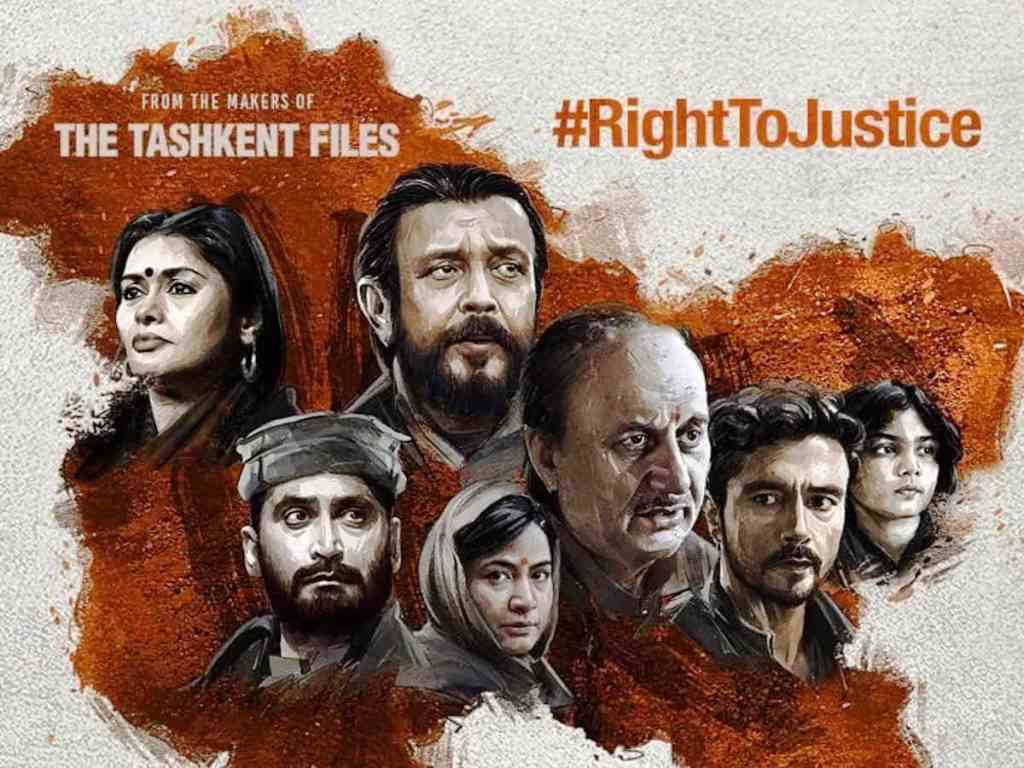
It is the responsibility of those who stand for truth to stand for this as well. I hope everyone will fulfil this.”
Home Minister, Amit Shah also endorsed and praised the movie. Subsequently, seven state governments made watching the film tax-free. Some even granted half day leave to their employees to watch the movie. This made the Agnihotri film a runaway success, making more money in the least time. By now, it has collected Rs 200 crore and is already a record.
The Story
Based on testimonies of the people, scarred and scattered by the insurgency in Kashmir, the film presents exodus as a full-scale genocide, akin to the Holocaust, that was deliberately kept away from the rest of India and the world by all those who mattered at that time.
To begin with, in the 1990s, Pushkar Nath Pandit, (Anupam Kher) a KP teacher, seeks a civil servant, Brahma Dutt’s (Mithun Chakraborty) help in protecting his son, Karan, (Amaan Iqbal) accused of being a spy. Brahma takes up the issue with Jammu Kashmir Chief Minister (Farooq Abdullah) but is placed under suspension.
One of Pushkar’s students, Bitta (Chinmay Mandlekar) becomes a militant commander, who seems like a combination of two real-life faces kills his son after barging into his home. He even forces Pushkar’s family to eat rice soaked in Karan’s blood and spares their lives. Desperate Pushkar telephoned his doctor friend for help, but before the doctor could do anything, militants took control of the hospital to get their own injured man treated.
Meanwhile, Vishnu Ram takes the Pushkar family to Kaul, a poet having better relations with Muslims. Kaul believed that militants see him as their man. He has already many scared KPs at home, mostly women. However, as Kaul was trying to pacify the pain, there was a sudden knock on the door and militants barged in and take away Kaul and his son, only to be killed.
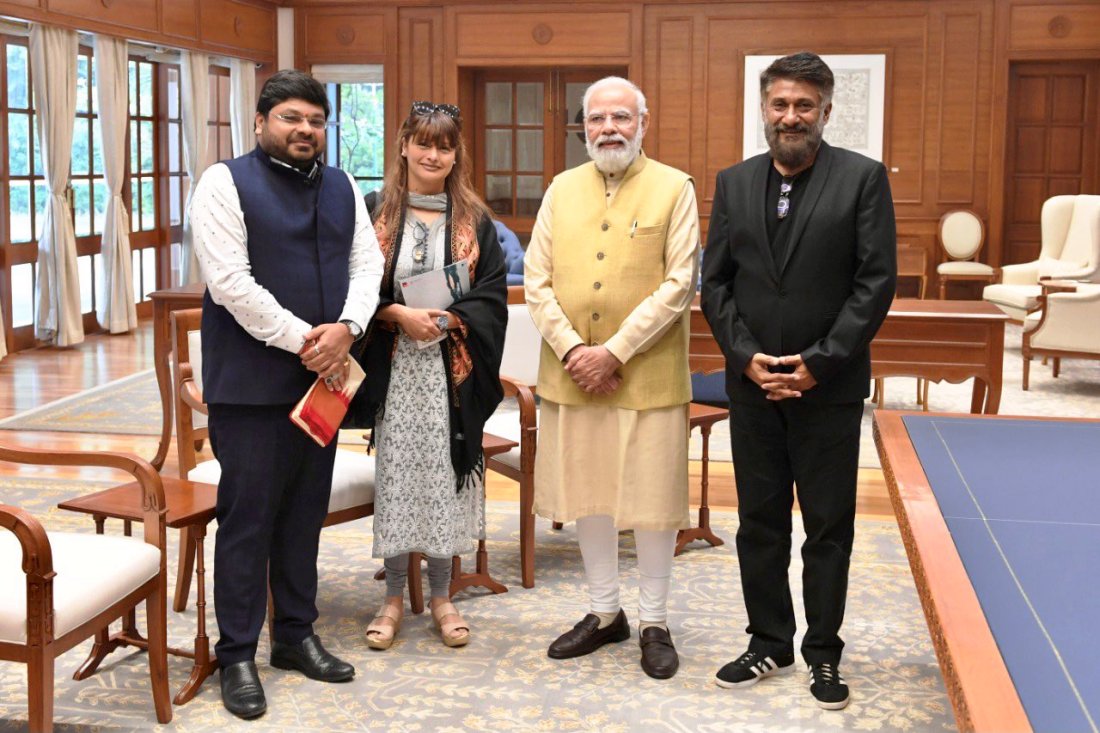
The next shot is in the truck, taking away KPs to Jammu, where they live in sub-human conditions with basic government support. Heavy-hearted elders in the camps were repeatedly asking for their homeland, “Ghar waendai ghar saasa bhaeri naeri ni zanh”. While lamenting the loss, an elderly lady passed away.
By then Brahma becomes an advisor to the new Governor, on whose request Home Minister visits the migrants where Pushkar seeks undoing of Article 370. He had written thousands of letters to the Prime Minister’s office, without any response. As depicted, the HM is indifferent to the pain of migrants, however, directs for getting “boroline” for them.
Then the film moves to Nadimarg where Karan’s killer, dressed in army fatigues, assembles some of the non-migrant KPs, and also the ones who preferred to return like a family of Pushkar and massacres them, brutally in a broad daylight. He strips a lady, Shadra and saws her body in half and later his son is also shot dead among others. Before this, a lecherous Muslim cleric is shown spitting on the woman.
It is Pushkar who adopts the lady’s orphan Krishna (Darshan Kumar) and tells him his parents died in an accident. Putting his medical exigency and other comforts aside, Pushkar insists to spend his pension on the education of his grandson.
However, while studying in JNU, he sees a pro-Kashmir lady professor Radhika Menon (Pallavi Joshi) and watches a debate on Kashmir. Tutored by his “liberal” teacher into believing that the secessionist movement in Kashmir is akin to India’s freedom movement, initially, he supports what the professor says but after Pushkar’s death, he travels to Kashmir where he gets details of his family’s annihilation. He meets the killer, who claims he had change of heart and terms allegations of killing Panidts as propaganda.. Back to Delhi, Krishna starts talking about the plight of his community. In a bid to prove his point, even the good old poetry of Faiz Ahmad Faiz , Hum Dekheinge comes to play.
Scenes
The movie as it starts with a cricket match on a cold freezing day in Kashmir in the early 1990s soon reveals the macabre mayhem on the streets. Cheering for an Indian player Sachin Tendulkar invites trouble for a Pandit boy. As the saga of violence begins, a persecuted KP woman is killed after lecherous remarks on her and her younger daughter by a militant on a roadside. The militant asks her to tell her husband to leave Kashmir. As one Kashmiri cop was killed, another meanwhile look ineffective and ran away..
Soon, the main villain is revealed as the streets reverberate with slogans of Ralev, Galev, Chalev (join us, die or leave). The scare is seen on the streets, Accompanied by Brahma, when Pushkar bought vegetables, the seller returned the change in Pakistani currency, which subsequently led to his arrest.
In one of the gory scenes, the villain lets Pushkar, his grandsons and daughter in law survive to reveal horror to the world. He kills his son after his Muslim neighbour collaborated with killers. As Pandit’s son hides in a rice drum, he is showered with bullets. The blood-soaked rice is offered as food to his wife by the villain, as a barter to her survival. The scene shows Pushkar’s face painted in Shiva-blue when his family is being massacred.
Decades later, on a cold morning, Brahma wakes up and flips through a selective thin file of newspaper clippings documenting KP killings. Then, there is a get together of four friends of Pushkar Nath whose grandson Krishna comes back to Srinagar, carrying Pushkar’s ashes, and with the help of his grandfather’s closest friends (as they bear guilty of failing their friend) learns lessons, which anguish him, and awaken him.
The story makes Pushkar the main protagonist through whom it offers details of the overwhelming crisis the KPs faced. On his deathbed, he counts letters written to the top office in Delhi as 6000 and passed away saying sheena paeto paeto (Snow come and fall). It is he who is at the receiving end of individuals and institutions played by a number of characters including the bureaucrat, a journalist (Atul Srivastava), a super cop (Puneet Issar), and an ex-doctor (Prakash Belawadi) – all retired from service.
The entire narrative mainly flips between violent flashbacks of the 1990s to Krishna’s life as a student under a liberal-snob professor, Radhika Menon, and Krishna’s awakening in contemporary Kashmir and his speech at JNU. However, when talking about minorities being targeted, Piushkar insists that Pandits were the majority in Kashmir and they were persecuted since 1300 starting from Muslim “tyrant” rulers who visited the valley and their “Sufis and Derveshs” by swords.
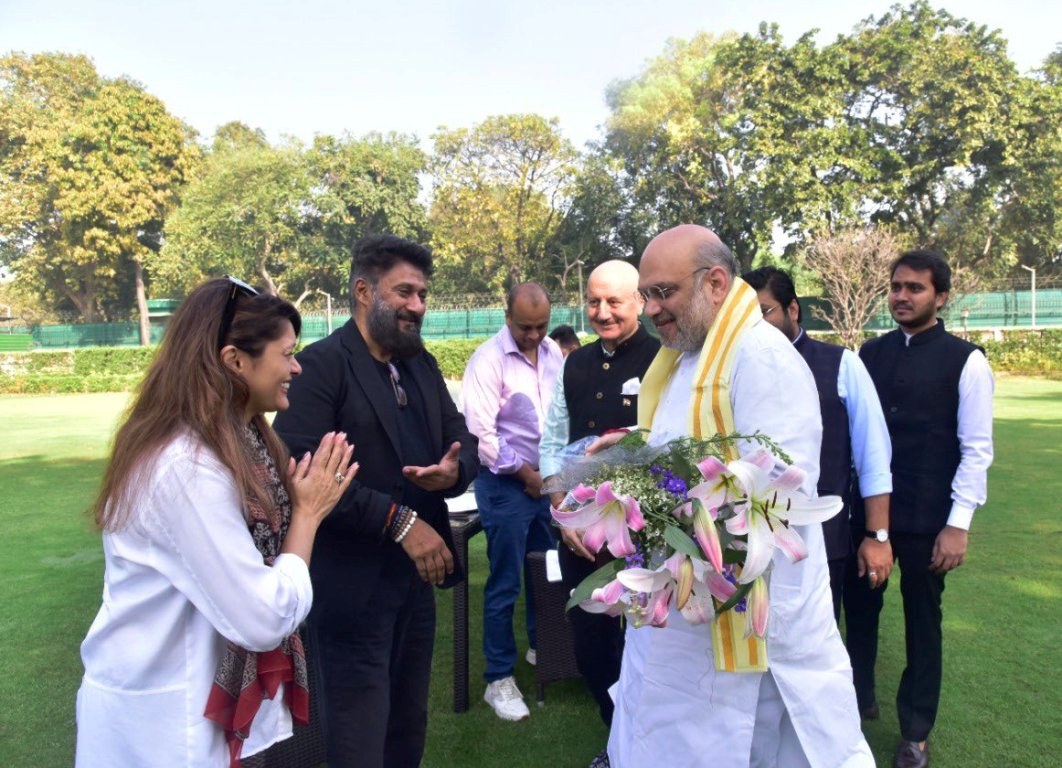
The film shows the Chief Minister as a playboy whose life revolves around golf and Bollywood actresses. Oblivious to “minority genocide”, the film justifies it by showing the killer in his lawn and his collaboration with militant outfits. The movie also shows the Prime Minister inviting the main villain of the movie to discuss Kashmir.
The film displays civilians as accomplices of militants. From children to clergy, everybody was involved in the anti-Pandit tirade. It shows Kashmiri women preventing the KPs from taking their rightful rations and in a way enforcing a social boycott. Scenes show men with lecherous motives over women and property.
The movie shows anti-national intellectuals confined to a red-bricked university lawn with connections to the separatists. It is there where Pushkar’s grandson is incited to rebel against the state. Eventually, however, his conscience crisis is ultimately put to rest when Brahma hands over the thin file to him. The reality check transforms him from an armchair liberal to a new-age orator who in a surprising monologue speech shuts down his professor, Radhika.
Media
There are several references in the movie accusing media of hiding the truth, peddling fake narratives, and missing reporting and documenting oppression on minorities due to the specific ethnicity and ideology of newspapers. A character in the film reveals that there is a set pattern in Kashmir protests, stone pelting, sloganeering and mourning to grab international attention. Besides, it is shown that a nexus works in Kashmir to portray victimhood before international media for mere few hundred rupees.
The film questions the terminology used by media and terms it as “mistress of terrorists”. It blames the media for recording quite a few cases of KP murders.
Reactions
While The Kashmir Files has emerged as a blockbuster, the contents of the film are being strongly reacted to. People knowing the filmmaking have their own issues the desi “Schindlers List” with it.
The reaction has been huge from Kashmir politicians. Omar Abdullah, former Chief Minister and the National Conference (NC) vice president sees it as a “concocted story”.
“If The Kashmir Files was a commercial movie, no one has an issue, but if the film-makers claim that it is based on reality, then the facts are the other way round,” Omar told a huge audience down south on the death anniversary of former assembly speaker Wali Mohammad Itoo. An NC lawmaker, Itoo was assassinated by militants at his Jammu residence. “The makers should clarify whether it is a documentary or a film.”
Omar said the film is holding the wrong people responsible. “When the unfortunate incident of Kashmiri Pandit migration took place, Farooq Abdullah was not the chief minister,” Omar said. “Jagmohan was the governor. It was V P Singh’s government at the Centre which was supported by the BJP from outside.”
“Why wasn’t VP Singh’s government and BJP shown in the film,” he asked. “It is not right to play with facts. We condemn the killings of Kashmiri Pandits. But didn’t Kashmiri Muslims and Sikhs lose their lives?”
Former Chief Minister cautioned film-makers against the untruths. “Don’t manipulate the truth. It’s not the right thing,” he told reporters. “There is a need to create an atmosphere where we could bring back all those who had left their homes and not create a communal divide.”
He said the film-makers with such interventions want the Pandits to stay out and away from Kashmir. “Today, an impression is being created that all Kashmiris are communal, that all Kashmiris do not bear the people from other religions. What will be achieved by this? Will it make the road easier for their return?” he asked. “I am afraid that the hatred which is being created against Kashmiri Muslims today, God forbid, our children studying outside the state, should not bear its brunt.” Addressing a party function, Omar asked if it was a documentary or a commercial film.
Earlier, Mehbooba Mufti said the aggressive manner in which the government of India is promoting the film and “weaponizing” the pain of Kashmiri Pandits makes its ill intentions obvious.
PAGD spokesman and Communist leader Mohammad Yousuf Tarigami said the migration of KPs has dented the identity of Kashmir and it continues to be a tragic chapter of Kashmir history. “I only have one thing to ask to those elements who are trading in the Kashmiri blood by selling it in various markets, that please stop. Whoever was killed, whichever religion he belonged to, but he was a Kashmiri,” Tarigami said. “While our innocent brothers and sisters from the minority community were killed in Budgam, who killed the passengers of a bus in Bandipore? If an innocent sister from the Pandit community was raped and killed in Sopore, then what happened in Kunan Poshpora?”
The communist leader suggested the Prime Minister to show boldness and constitute a truth and reconciliation commission as happened in post-apartheid Africa to know who was killed and by whom. “While those killed will not return, but accountability will be established. Their families will come to know who killed them,” he said.
Even the student community is scared. National Conference and Jammu Kashmir Students Association have asked students to take precautions while requesting the central government to take care of thousands of them. The government has already upgraded the security of the film director.
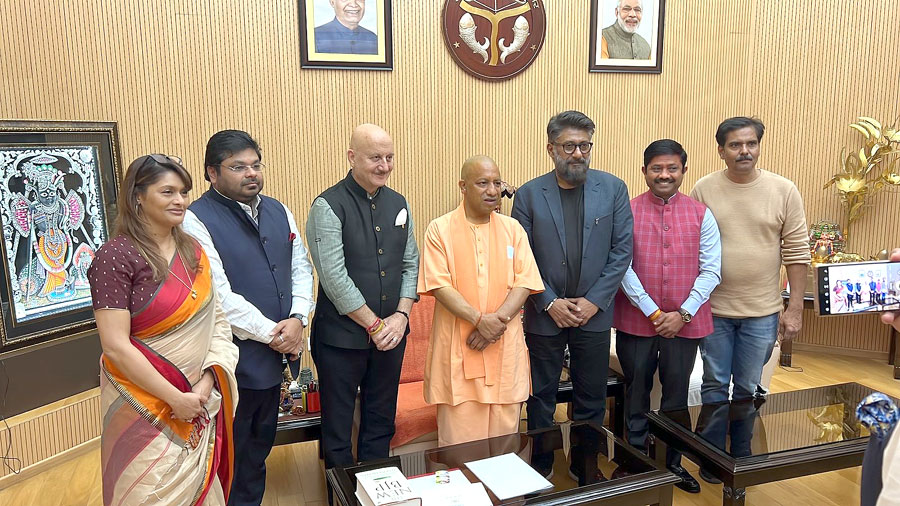
The reactions have started from outside Kashmir too. Mamta Banerjee, the Chief Minister of West Bengal has even gone to the extent of terming it a ‘conspiracy’. “The movie is mostly fiction and it is all planned,” she was quoted saying.
Congress leader Jairam Ramesh denounced the film and termed it “propaganda”. He tweeted: “Some films inspire change. Kashmir Files incites hate. Truth can lead to justice, rehabilitation, reconciliation and peace. Propaganda twists facts, distorts history to whip up anger and promote violence. Statesmen heal wounds. Pracharaks exploit fear and prejudice to divide and rule.”















